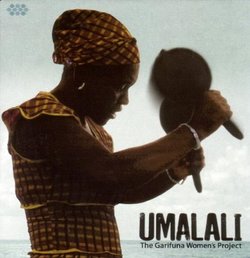| All Artists: Umalali Title: The Garifuna Women's Project Members Wishing: 2 Total Copies: 0 Label: Cumbancha Original Release Date: 1/1/2008 Re-Release Date: 3/18/2008 Genres: International Music, Pop Style: Number of Discs: 1 SwapaCD Credits: 1 UPC: 890846001060 |
Search - Umalali :: The Garifuna Women's Project
 | Umalali The Garifuna Women's Project Genres: International Music, Pop
Blending the rich vocal textures of women from the Garifuna communities of Central America with echoes of rock, blues, funk, African, Latin and Caribbean music, Umalali is an entrancing journey into the heart and soul of a... more » |
Larger Image |
CD DetailsSynopsis
Album Description Blending the rich vocal textures of women from the Garifuna communities of Central America with echoes of rock, blues, funk, African, Latin and Caribbean music, Umalali is an entrancing journey into the heart and soul of a unique and inspiring culture. From the award-winning producer of Andy Palacio & the Garifuna Collective's Watina comes this album of indescribable emotion, strength and beauty. Enhanced CD includes over 30 minutes of video footage, bonus tracks, slideshows and other special features. Similarly Requested CDs
|
CD ReviewsSome beautifully arresting music. It gets under your skin. India | 06/01/2008 (4 out of 5 stars) "Andy Palacio's Wátina was one of last year's most highly rated world albums, a showcase for the music and culture of his Garifuna people, descendants of shipwrecked slaves who retain powerful African influences in their villages on Belize's Caribbean coast. While Palacio died suddenly in January, his legacy is continued here by his producer, Ivan Duran, who brings together a number of singular female voices to explore the women's side of the Garifuna story. The Garifuna communities of Central America's Atlantic coast are beginning to seem like the new Cape Verde -- there is so much good music coming out of there. The truth is that it has as much to do with the love of Belizean producer Ivan Duran for the music and the people as any one musician breaking it big. "Umalali" is one of those records that keeps getting under your skin. Plaintive harmonised voices call and respond over the traditional beat of the music and are subtly and successfully added to by sensitive production and additional instrumentation to produce an album that is every bit as good as the late, great Andy Palacio's and a good deal more consistent throughout. The album was built up over many years. Research giving way to field recordings, followed by studio recording, giving way to additional instruments and finally the whole thing was painstakingly produced. It is, like the Garifuna themselves, a fusion but where it succeeds over the vast majority of field recordings meet studio time projects is in the seamlessness of the end result. It feels every bit the kind of music you might hear sung on a Caribbean evening by a couple of guys with guitars coming back to the village and jamming with the women folk. In music as in much of life, intention is every bit as important as execution. No sane person would go about making a recording in this way if their intention was just to spice up some traditional sounds for a global market. The gnarled and penetrating voice that opens this enchanting disc belongs to 54-year-old Sofia Blanco, and her gently scolding song was composed by her husband Gregorio. They've been singing together for nearly four decades in this lovely Guatemalan/Honduran/Belizean answer to the blues. Their drumming is Nigerian, their main language is Spanish, and their "paranda" musical tradition is Carib: a fascinating mix, leading to some wonderfully arresting music. Duran's guitar-based arrangements deftly draw out the music's diverse resonances, nudging towards proto-funk, Afro-pop and blues without disrupting the informal barefoot-on-the-beach feel: the voices combining throaty warmth and vigour with a spooky African yearning. Yet while there's the intimation of a strong, self-contained women's musical culture, Duran's male hand on the tiller prevents it from emerging as powerfully as it might. Still, this as an affecting album, full of unusual and beautifully realised moods and textures. The songs deal with all aspects of Garifuna life in Belize, including hurricanes and murders as well as work and childbirth. Propelled onwards by guitar and drums, their effect is gracefully seductive. Also welcome on this album is the variety of pace from the fast and frantic "Áfayahádina (I Have Traveled)" to the anthemic and intoxicating opener "Nibari (My Grandchild)" and back again to the catchy, sax-laden "Mérua"." Music that cuts through the noise of your life and grounds y Jesse Kornbluth | New York | 04/10/2008 (5 out of 5 stars) " When my heart hardens and my armor needs piercing, I go to the music of women. And if they don't sing in English, the better --- it's the sound that heals. Like the first 30 seconds of Noirin Ni Riain. Or anything by the Divas of Mali. And, now, the Garifuna women of Belize. I have already praised Andy Palacio and the Garifuna Collective. That effort to save a culture and language from extinction was admirable. But even more, the music was spectacular --- I thought this was the most interesting World CD I heard in 2007. And now, ten years in the making, we have a dozen songs by Garifuna women. It was recorded where Ivan Duran, the CD's inexhaustible producer, found women singing: in kitchens, streets, temples. They sang of the life they knew. And, when asked to record, they showed up when they could make time. One song was inspired by a conversation overhead between a grandmother and her granddaughter. "Leave behind those street-walking girlfriends of yours," she says. "That is not glory, that is not luck. Good luck for you is obeying my words." Another song asks an unborn child why his birth is so difficult. Another, again sung from a mother's point-of-view, laments rumors that she is prostituting her daughter: "All I can do is look around, I am so disappointed/ It is all over the newspapers on the streets." Almost as an answer, another singer dismisses all gossip about her: "I only depend on one thing, and that is work/ No one will make me hang my head here." Another song is a wife's lament to her traveling husband. And, perhaps the saddest, is a mother's cry at hearing the news that her policeman son has been killed in a brawl. "What will become of me on this earth now that you're gone?" she asks. "What shall I say to your siblings when they arrive?" These lyrics are not exactly a pick-me-up, so the good news is that you won't understand a word they're singing. But the feel of the CD isn't sad in any way. The music is pretty much pure joy. The joy is the living, the simple fact of it. History bypassed these women long ago; theirs is the life of eternal duties, ancient rhythms and primal emotions. Photographed in cotton dresses against sand and sea, they look wise. And they look beautiful --- beautiful because of what they know rather than how they look. And so, when they sing, you feel they are singing truth. They don't really have another reason to sing --- they've had no show-biz careers and won't get them now. So these songs are like field recordings, which are then layered and processed and yet somehow still sound authentic. I've had "Umalali" in heavy rotation for weeks now, as an antidote to a tsunami of bad news and the prospect of more coming. I hear the strumming of guitars, the pulsing of drums, and then, like a knife, Sofia Blanco asking for a moment with her granddaughter. I don't know how that conversation worked out in the lives of its characters. In my life, she has my fullest attention. " Another great album from the Garifuna enclave Joe Sixpack -- Slipcue.com | ...in Middle America | 04/10/2008 (5 out of 5 stars) "The Garifuna people live in enclaves along the Caribbean coast of Belize and other Central American countries; they have strong, vibrantly alive African roots and, up until modern times, their own distinctive language and dialects. A few decades ago, the Garifuna culture was in danger of dying out, but in the 1980s a group of younger artists seized it back from the precipice, embraced it, and brought it into the 20th Century. One of their most prominent artists, Andy Palacio, delved into the wellspring of Garifuna traditional music, both preserving the fading oral tradition and combining it with rock, jazz, and other outside influences. He led several bands, and more recently released solo albums including his last one, "Watina" (also on the Cumbancha label) which brought widespread acclaim, just before his untimely passing away early in 2008.
Despite the loss of its great champion, Garifuna culture appears to be healthy and thriving, at least if this fine compilation album is any indication. This is a set of music featuring several women from Palacio's own region of Belize, with keening vocals set against sleek, velvety modern arrangements. Sofia Blanco, Desere Diego, Bernadine Flores, Damiana Gutierez, Sarita Martinez: none of these are famous musicians -- indeed, their singing style is marked by its roughness and authentic rural character, a distinctly African vocal style that's rather similar to the "roda de samba" samba circles sung by older women in Bahia, Brazil. The pairing of the contemporary pop production and their other-worldly chanting seems potentially perilous, but much to the producers' credit, they don't subsume the women's vocals, don't remix or gussy them up, but rather play off of them, and support them delicately and with admirable restraint. Although the rugged core of their pre-modern culture is left intact, the album is surprisingly rich and engaging... Another nice one from this up-and-coming new label! Recommended. (DJ Joe Sixpack, Slipcue music reviews)" |

 Track Listings (12) - Disc #1
Track Listings (12) - Disc #1







